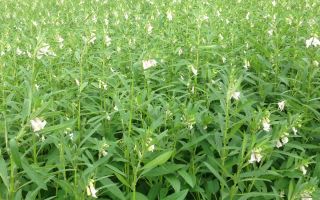Content
Famous words from the tale of Aladdin "Sesame, open up!" fully relate to the seasoning that has long been known to mankind - sesame seed. Its ripe pods open with a loud crash. Sesame meant immortality and was a symbol of the eternal life of Ancient Egypt. The benefits and harms of sesame in the modern world are considered from the point of view of its effect on the human body.
How and where does sesame grow
Sesame belongs to the genus of the carrion family. These herbaceous plants began their existence in the tropics of South Africa. One of the varieties - Indian sesame grows in Asia, is cultivated in the North of America. Plants can grow up to 1.5 m in height, while their root grows up to 80 cm. The thick stem begins to branch from the very base, the leaves grow up to 30 cm in length. The plant begins to bloom in early summer, and forms fruit by the end of August.
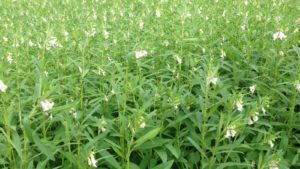
Large flowers can be pink, white, or lilac. The fruit is a semi-oval nest box with elongated flat seeds. They reach a size of 4 mm and can be white, yellow or black.
There are 2 main types on sale: white or black. They vary in taste. The secret lies in the fact that black seeds are not peeled. The taste of the white seed is softened, has a nutty note, and contains an increased content of fatty oils.
Composition and calorie content of sesame
The benefits and harms of sesame seeds depend on its composition and method of use. The calorie index of the grains is quite high due to the presence of fatty sesame oil. 50 g of sesame contains about 300 kcal. The fat concentration exceeds 50% of this volume.
A unique substance called sesamin has been found in the composition of sesame: it is this substance that has properties beneficial to human health.
Sesamin is considered a natural natural antioxidant that slows down the aging process and fights free radicals.
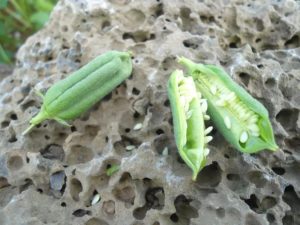
The benefits of sesame seeds or their harm to the human body are explained by the high content of fatty oil, which contains acids:
- oleic;
- linoleic;
- palmitic;
- stearic;
- peanut;
- lignin.
The seeds are also rich in useful microelements, among them the highest in calcium. Vitamins B 1 and C endow sesame with beneficial properties for the human body.
The benefits of sesame seeds
Sesame seeds have a variety of medicinal properties. They owe this to the unique substances of the composition that nature gave them.
- The presence of calcium in the composition makes sesame useful for normalizing the formation of musculoskeletal tissue.Calcium is required by the body for natural growth and development.
- Vitamins and natural antioxidants help to improve the appearance of hair, nails, and skin.
- Phytoestrogens, which are considered analogs of female hormones, in sesame are useful as reproductive activators for women. In addition, they have the ability to prevent the development of cancer.
- The plant contains two compounds - sesamin and sesamolin, which are water-soluble antioxidants that effectively prevent aging and the development of oncology.
- These unique substances in the composition of sesame also contribute to the normalization of blood circulation throughout the body, and prevents the development of atherosclerotic plaques. This is beneficial for people suffering from cardiovascular disorders.
- Vitamins with trace elements contribute to the natural growth and normalization of the activity of all organs.
Why sesame seeds are useful for women
The benefits of sesame seeds for women lies not only in normalizing reproductive activity, but also in helping to improve hormonal levels. Essential oils affect women's psycho-emotional states in difficult periods of life.
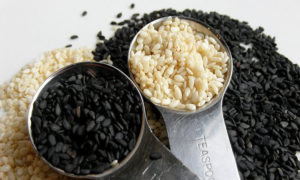
Sesame seeds for men
Sesame seeds are a natural aphrodisiac, which makes them attractive to men. Phytosterols help to normalize the functioning of the reproductive system.
Regular use of seeds as part of complex products has a strengthening effect on the heart muscle, helps to restore strength after intense physical exertion.
Benefits of sesame seeds for the elderly
The benefits and dangers of sesame seeds for the health of an elderly person can be talked about from the point of view of moderate consumption and taking into account the physical condition.
The particular benefit of white sesame seeds for people over 50 years old lies in the fact that it is a source of assimilable calcium. At this age, calcium is necessary for the prevention of diseases of the musculoskeletal system. In addition, doctors talk about the beneficial properties of grains, which contribute to:
- prevention of osteoporosis;
- age-related changes;
- preventing the development of cancer;
- positive impact on brain activity and, as a result, prevention of Alzheimer's disease.

Can sesame seeds be pregnant and lactating
The centuries-old experience of traditional medicine claims that sesame tends to harm the intrauterine development of a child during pregnancy. Despite the high content of calcium, copper and fatty acids, the use of sesame seeds during the period of gestation can provoke an increase in the tone of the uterus.
We can talk about the benefits of sesame seeds for pregnant women only if the woman has no problems with bearing and she uses seeds occasionally.
In order not to harm the development of the baby, as well as to avoid an allergic reaction, sesame should not be consumed during the first three months of pregnancy.
During the lactation period, sesame seeds:
- have a beneficial effect on milk production;
- improve its taste;
- increase fat content.
In addition, the properties of the seeds are beneficial to prevent the development of mastopathy. Calcium in the composition of sesame is useful for both a young mother and a baby.
At what age children can be given sesame seeds
Sesame seeds for children have a particular benefit in sesame milk. It is offered to children from 1 year old. The only obstacle that can harm the baby's health is the development of an allergic reaction.
Before introducing sesame milk into the diet, you should ask your pediatrician's opinion.In the absence of allergic reactions to sesame milk, it is recommended to cook porridge and other dairy dishes.
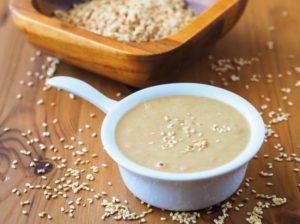
The benefits of sesame for weight loss
Modern nutritionists argue about the benefits or dangers of sesame seeds for weight loss. The harm of seeds is considered in terms of the high content of oils and the high calorie content of the product.
The weight loss benefits of sesame seeds, according to sports nutritionists, lie in antioxidant properties. In addition, plant fiber affects the improvement of metabolic processes. Improving metabolism while dieting is considered one of the most important necessary items.
How to consume sesame seeds
Sesame can be consumed in many ways. Sesame oil is widely used in cooking. Various dishes are prepared on it, which increases their beneficial effect on the body.
For medicinal purposes, seeds are taken: they can be slightly warmed up, brewed with water or consumed raw.
For the preparation of medicinal products, the seeds are ground in a coffee grinder and then mixed with additional ingredients. They are also often used as a condiment for salads, rice, cookies, and other baked goods.
Particularly popular in the countries of the East is grain-based tahini paste, it benefits from systematic moderate use as a means of improving overall well-being.
For lowering blood pressure and cholesterol
To prevent an increase in blood cholesterol levels, it is recommended to take cold-pressed sesame oil, it normalizes blood pressure. 1 tsp drink 3 times daily.

A mixture of sesame oil and honey has healing properties: the benefits of such a remedy lie in normalizing blood flow and improving the condition of blood vessels. 1 tbsp. l. mixtures are taken daily for a month.
How to eat sesame seeds for better calcium absorption
To increase the effect of beneficial properties, it is recommended to soak the seeds for 5 - 6 hours. This method improves the absorption of calcium by the body. Grains take 1 tsp. daily.
How much sesame seeds can you eat per day
The benefits of taking fried or raw sesame seeds can exceed the harm indicators only if all the rules for its daily use are followed.
The norm of the use of semen for an adult is 100 - 150 g daily.
The use of sesame seeds in cosmetology
The beneficial properties of sesame seeds for women have found application in home cosmetology; masks for hair and face are prepared on its basis. Sesame oil is most often used for the preparation of funds, since it has unique beneficial properties:
- helps to moisturize dry damaged skin;
- activates regeneration processes.
The benefits of sesame flour in cosmetology are also high. The seeds are ground with a coffee grinder, additional ingredients are added to the flour. They can be: honey, essential oils, pomace of herbaceous plants, various extracts.
How sesame seeds are used in cooking
Sesame seeds are known to culinary experts as a valuable spice. Arabic dishes are traditionally prepared with sesame. It is used to make tahini, hummus, chickpeas. These are colorful traditional dishes where sesame is one of the main ingredients.
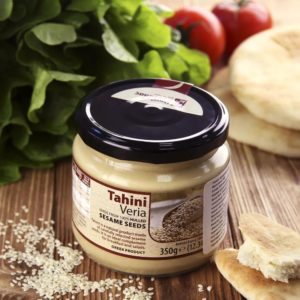
On the territory of Europe, baked goods are common, which are sprinkled with seeds at the last stage of heat treatment.

Sesame is used as a finishing element for various vegetable and meat salads. The seeds greatly improve the taste and appearance of food.
Cookies are traditionally made from sesame flour, halva is made on the basis of sesame paste. These desserts are especially loved by the people of the Middle East.
The benefits and uses of sesame milk
Sesame milk is used as a means to increase the body's calcium stores. It is especially beneficial for infants. If it is impossible to digest cow protein with sesame seeds, prepare coconut or soy milk. Such a remedy enriches the body with nutrients, compensates for the lack of calcium and increases the body's immune forces.
To prepare sesame milk, take:
- 100 g of seeds;
- 1 liter of liquid (water or milk).
The grains are soaked for 5 - 6 hours. The water is drained, the seeds are poured with the prepared liquid, then beat with a blender, a sweetener is added. The resulting drink is filtered. Berries, fruits, cinnamon are used to improve the taste. This mixture is stored for no more than a day.
Harm of sesame seeds and contraindications
The harm of sesame seeds depends on the way they are consumed. Exceeding the daily dose can cause the development of all kinds of complications.
- Sesame can be harmful to people suffering from diseases of the gastrointestinal tract, which are associated with increased acidity of the stomach.
- In pathological kidney disease, the harm from the use of seeds may outweigh the possible benefits due to the risk of deposit formation.
- Eating raw grains on an empty stomach can cause harm in the form of increased thirst or heartburn.
How to choose and store sesame seeds
The indicators of benefit or harm to the human body depend on the choice and storage of sesame seeds. Seeds should be selected in specialized sections of grocery stores. The grains should be dry and light, with no signs of damage.
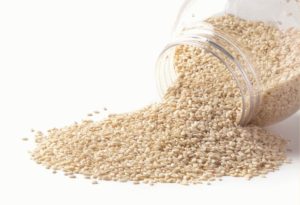
After purchase, the seeds are recommended to be poured into a glass container with a sealed lid. They are stored away from direct sunlight. The shelf life of the grains under optimal conditions is 6 months.
Conclusion
The benefits and harms of sesame are concepts that are closely related. The content of essential oils makes the grains especially healthy. A moderate intake of sesame normalizes calcium levels in the body, improves general condition, and helps relieve nervous tension. Seasoning can give dishes a unique taste and make them more interesting and attractive.
Reviews

